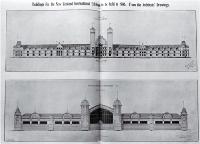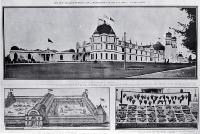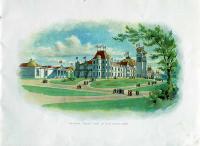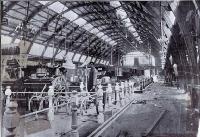Machinery Hall
- The Machinery Hall was a large space as the exhibits it contained were on a large scale.
- These exhibits included examples of industrial machinery of the time and transport such as full-sized locomotives.
The Building
The Machinery Hall was adjacent to the Main Building, its façade running parallel to Park Terrace and measuring 316 feet (96 metres) long. The entrance to the hall was arched, flanked by two small towers. These towers had semi-circular pediments with curved decorations at the top and were decorated with a frieze, depicting roses, thistles, shamrocks and fern leaves. The immense semi-circular wooden roof had a span of 80 feet (24 metres), said at the time to be the widest barrel-vaulted wooden roof ever made. Below the roof was a row of windows 7 feet (2 metres) high, extending along the length of the building. The exhibition space below measured 316 (96 metres) by 305 feet (93 metres).
The Machinery Hall was designed in a classical style by Frederick John Barlow. The contractors for the Machinery Hall were W.W. Smith and the total cost was £9,570.
The Machinery
The Machinery Hall was dominated by locomotives, signaling apparatus and other machinery from the Railways Department, as well as by exhibits from the Prisons, Mines, Defense and Public Works Departments. It formed "a complete museum of modern means of locomotion, of mechanical appliances, and general machinery of an up-to-date character, all triumphs of scientific engineering, and of the methods of dealing with some of New Zealand's staple products".1
Machinery on display also included gas engines, woodworking machines, tractions engines, appliances used in manufacturing butter and cheese, wool-scouring apparatus, a display of printing machinery and lithographic work ; incubators, bicycles and motorcycles, and "a splendid parade of motorcars, a delight to the eye in their beauty of finish and their luxury of furnishings".2
Refrigeration
A space of 75 feet (23 metres) by 20 feet (6 metres) in the hall was occupied by the Government frozen-produce room and refrigerating machinery. This included:
- four refrigerating machines (and gas engine)
- an ice-tank (capable of making half a ton of ice per day)
- and a produce-room
The produce room displayed samples of the frozen produce exported from New Zealand, such as butter, meat, and poultry.
Power generation
In the south-west corner of the hall was the electric-lighting-plant installation, consisting of two compound engines, one of about 120 horsepower and the other about 175 i.h.p., the larger one running a 110 kilowatt generator and the other a 75 kilowatt generator. There was also a self-contained electrical generating set comprising a Bellis engine and a Thomson-Houston generator of 75 kilowatts, and other electrical equipment.
![]()
Related photos
Sources
Footnotes
Related links
- Frederick John Barlow, 1868-1939









